The Olympics: Are they worth It?
An athlete’s journey to the Games, with all the stress and sacrifices, can be tougher than the competition itself
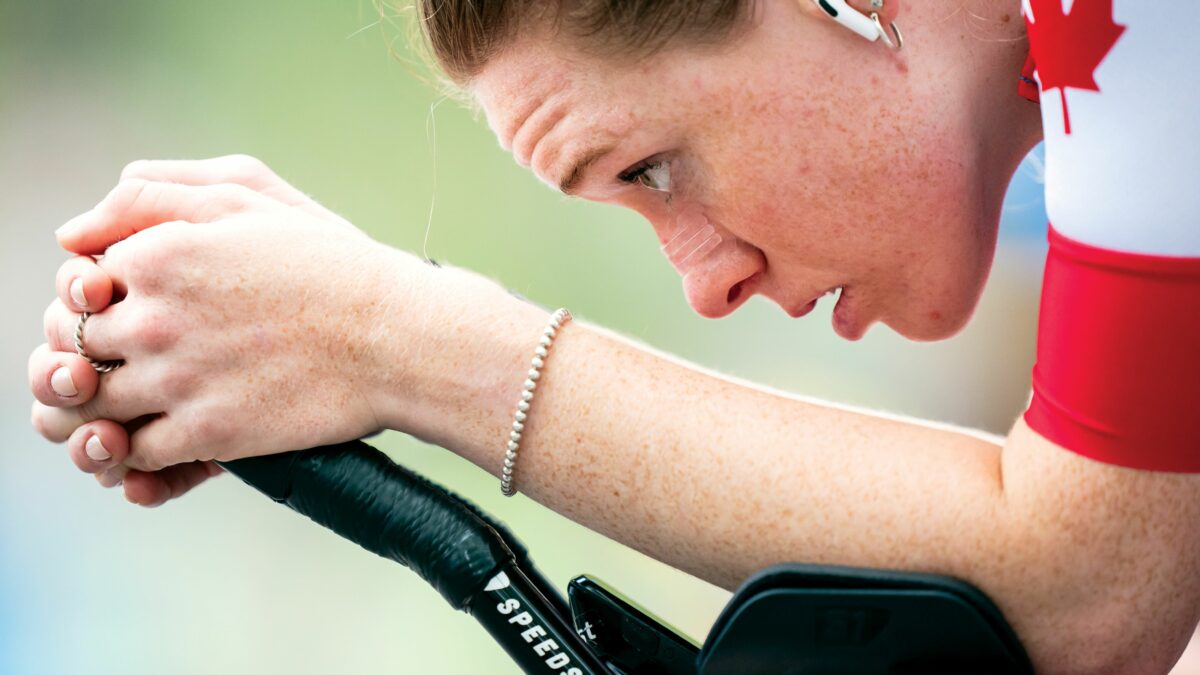 Photo by:
Dave Holland
Photo by:
Dave Holland
Since this story was published, the Canadian cyclists heading to the Olympics have been formally announced. However, the importance of the qualifying and the stress it can take on cyclists mentioned in this article remains the same.
The Olympic dream. It’s such a casual turn of phrase. You simply assume that it’s referring to a worthy, worthwhile cause. But is it truly worth the heartbreak and heartache, the trials and tribulations, the behind-the-scenes work that people tuning in once every four years to watch the Games will never see? Sport takes a physical toll on athletes’ bodies as they strive to bring home the gold for their country, to hear “O Canada” piped out on a global stage. But the mental pressure? The ever-changing set of criteria that determine whether you’ll be racing or not? The teary phone calls between racers and friends, family, coaches, and yes, mental health professionals? There can even be legal battles that take place in the weeks before the Games as athletes look for judgments on a selection processes that might not have been followed properly. Here, I spoke to several past and current Olympians, plus one of the professionals who’s worked with many Canadian cyclists throughout the years to explore one simple question: is the Olympic dream worth it?
Paris Olympic athletes won’t have air conditioning in Village
When you cover professional cycling for a couple of decades, you watch a lot of athletes come and go from the sport. The highest drop-out rate tends to come the year after an Olympic cycle. There’s plenty of evidence that also suggests that rates of depression and anxiety in professional athletes are high in any season, but are even higher in an Olympic year. Luckily, that fact is becoming more commonly acknowledged, which means athletes can get the help that they need—while still going for their goals.
“The acknowledgement that it’s hard doesn’t mean that it’s not doable. It just means that it’s hard,” says Sharleen Hoar, one of the mental performance consultants who works with Canadian Olympic hopefuls throughout the process of qualifying and racing at the Games. “We know that athletes perform the best when they’re authentically themselves. If they’re trying to hide and say that they’re not struggling, they can’t be authentically themselves, and they’re wasting precious energy that could be put toward their performance.”
Mountain biker Haley Smith has been vocal about her struggles with mental health in recent years, particularly around the Tokyo 2020 Games. “To be completely honest, I don’t really have memories from the race or the moments after,” she reflects. “My memory formation from that period of time is really bad, which is apparently very common with highly stressful experiences. When people are under high degrees of stress, their brains don’t work properly, so they don’t have very good memories. So I can’t tell you what happened in the days around the Olympics. I do remember waking up the morning of the Olympics and knowing in my gut that it was going to be the last time I ever raced a bike, which is not a great place to be when you’re going to the start line. I wanted to give it my absolute all, but all I could think was, this has broken me.”
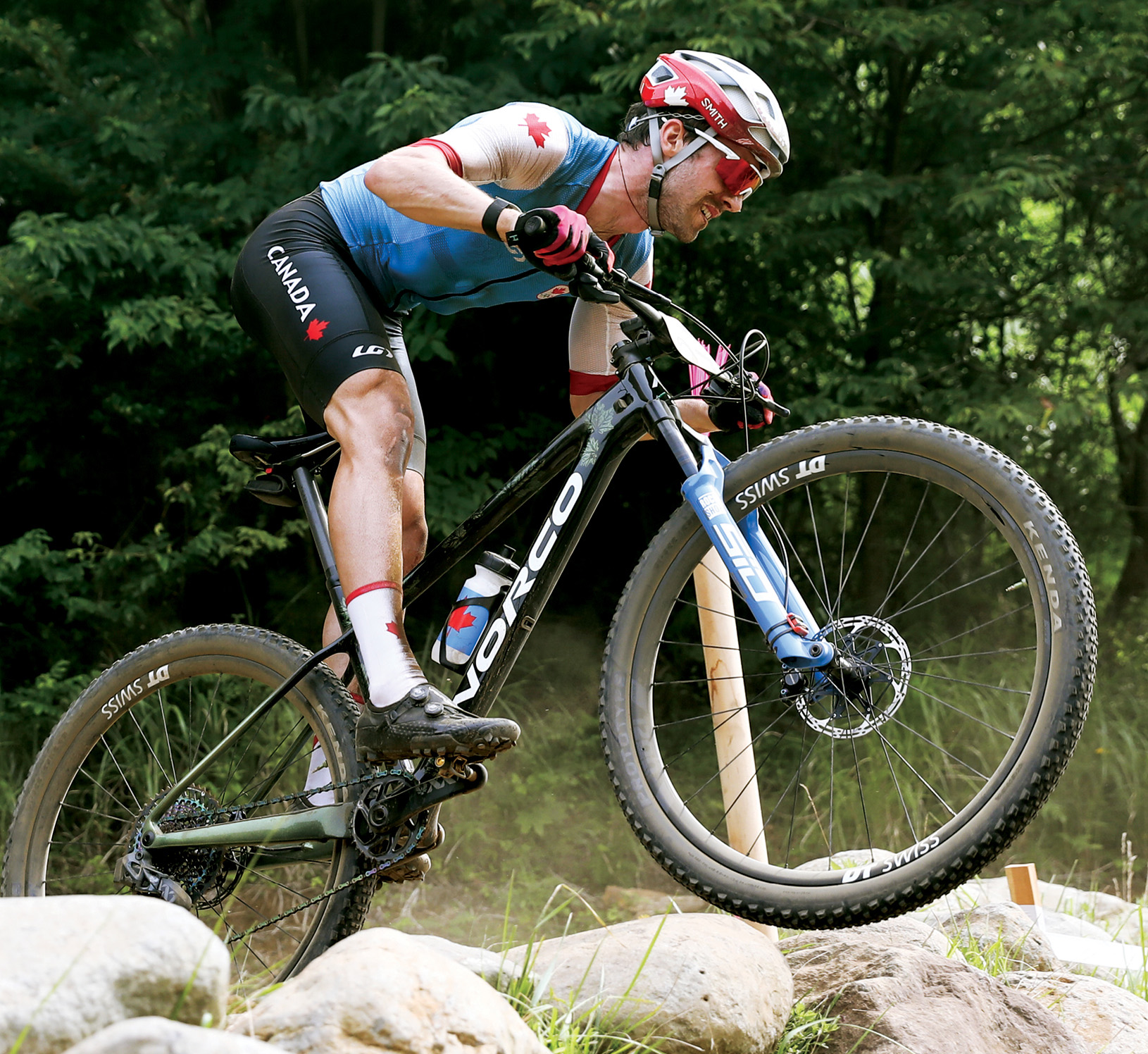 Peter Disera in Tokyo
Peter Disera in Tokyo
photo: Simon Wilkinson
Fellow mountain biker Peter Disera had a similar experience in 2021. “In broad strokes, yes, it was worth it,” he says. “It was something to work toward, this ultimate lofty goal. But to be honest, if you asked me what was more exciting in my career, I would list the Olympic test event for Tokyo, not the Games themselves, because the test event was so much fun. It felt like a vacation race at the end of a long season, and we had a real taste of what Tokyo was really like—including the food, which got changed out in the actual Games to be more white bread, less authentic dishes. As an athlete who thrives on diversity, I preferred the test event!”
Is it finally time to rethink the Olympic XCO qualification process?
The real irony of making an Olympic team is that for many athletes, simply making the team takes everything that they have. The qualifications for Olympic selection take many months. Often athletes don’t know if they’re going until the event is weeks away. When they do make it, there isn’t a lot of time to pivot to performance goals for the Games themselves.
“My dream was to go, not to perform,” admits Smith. “I shot too low.”
And what if you don’t make it? We’ve heard Simone Biles and Michael Phelps openly discuss their mental health struggles. On the flip side, those athletes are two of the most decorated Olympians in history. If you asked them if they’d trade the struggles for their medals, it’s unclear which they’d choose. Was the dream worth it? Probably. But what if your dream is a dream denied?
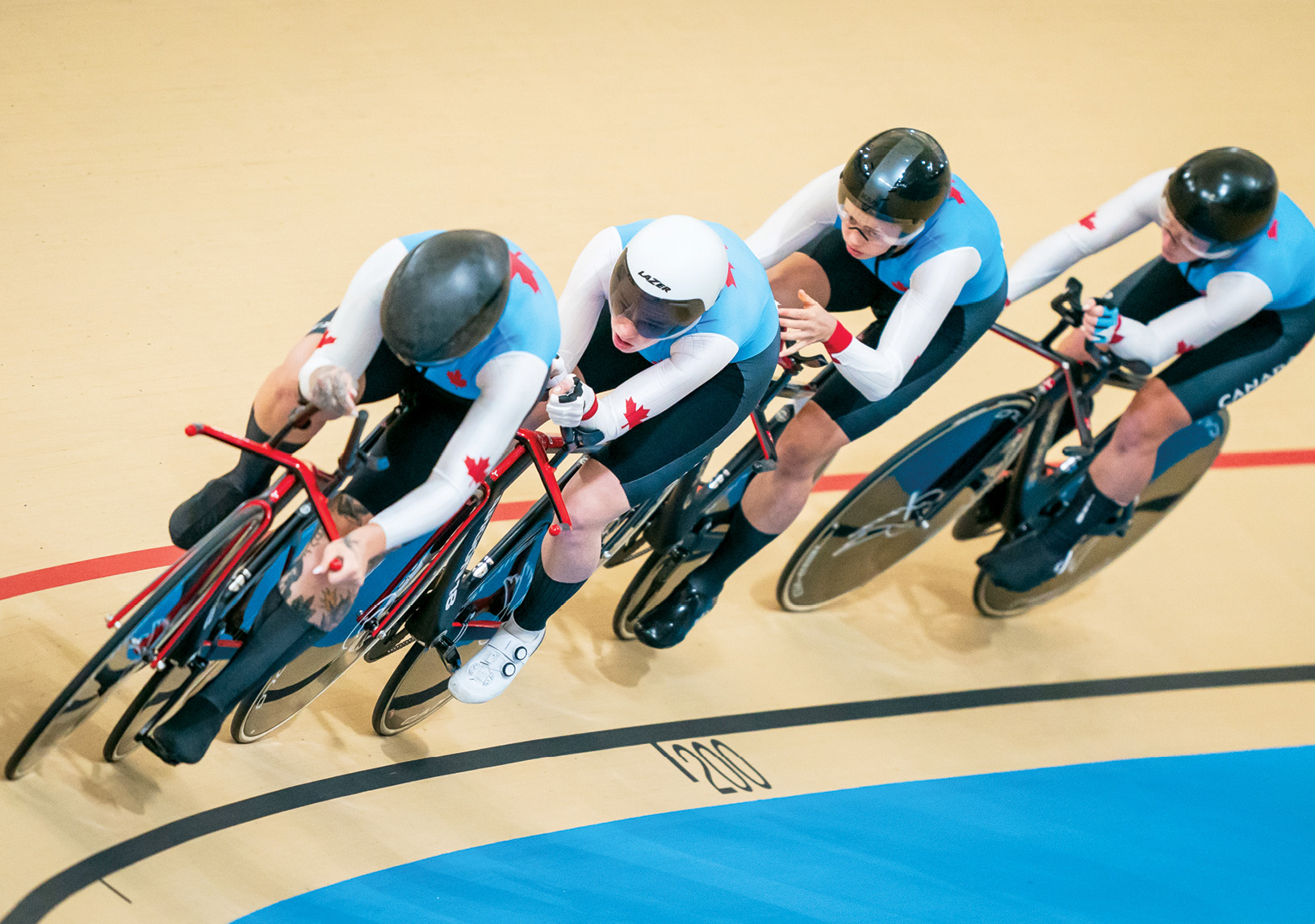 Ruby West and the women’s team pursuit squad at the 2023 Pan Am Games in Santiago, Chile
Ruby West and the women’s team pursuit squad at the 2023 Pan Am Games in Santiago, Chile
photo: Dave Holland
Cyclocross racer turned track cyclist Ruby West was in the track program for the past couple years striving for an Olympic berth. This past December, just months before final selections were made, she pulled the plug, quitting the program to focus on living her life. Just months earlier, she’d been talking about Paris and the races she’d need to perform in to get there. She’d won a gold medal in the team pursuit at the Pan Am Games. So why was she leaving the dream behind?
“The Olympic dream is so powerful,” West says. “In some ways, it feels like a toxic relationship where you’re hating everything about the process, but you love it too much to leave. ‘It’s the Olympic Games, I can’t give up on that.’ That’s how I felt for the longest time. But then, I finally realized: being an Olympian is not going to change my life, but being this miserable every single day is.”
The dream no longer made sense for her. She wasn’t in love with track, she was in love with the idea of being an Olympian—like her dad, swimmer Mike West, and like her fiancé, Derek Gee. But being an Olympian didn’t equate with loving the sport.
“I’ve said before that the Olympics were my North Star. But that became a negative, because it meant any other victory, like Pan Ams, was just a necessary step to get to the Olympics, not something to be celebrated,” West says. “I couldn’t see the forest for the trees. These races were literally just boxes to be checked off along the way.”
Selection criteria also played a role in West’s decision—similar to how selection criteria and subsequent arbitration were a huge part of Smith’s stressors leading up to the Games in 2021.
“I had likely qualified really early with my World Cup podium in Nové Město,” Smith, who was third at the event in 2019, explains. “But then, I spent two years in limbo. I had the best World Cup result within the qualification period. Unless other athletes got a first and a second, which was unlikely, then yes, I had qualified. But then the pandemic happened. There was a long period of time where we weren’t sure that the 2019 result would count. The qualification wasn’t final until four weeks before the Games. I think that’s a large part of why I struggled so badly.”
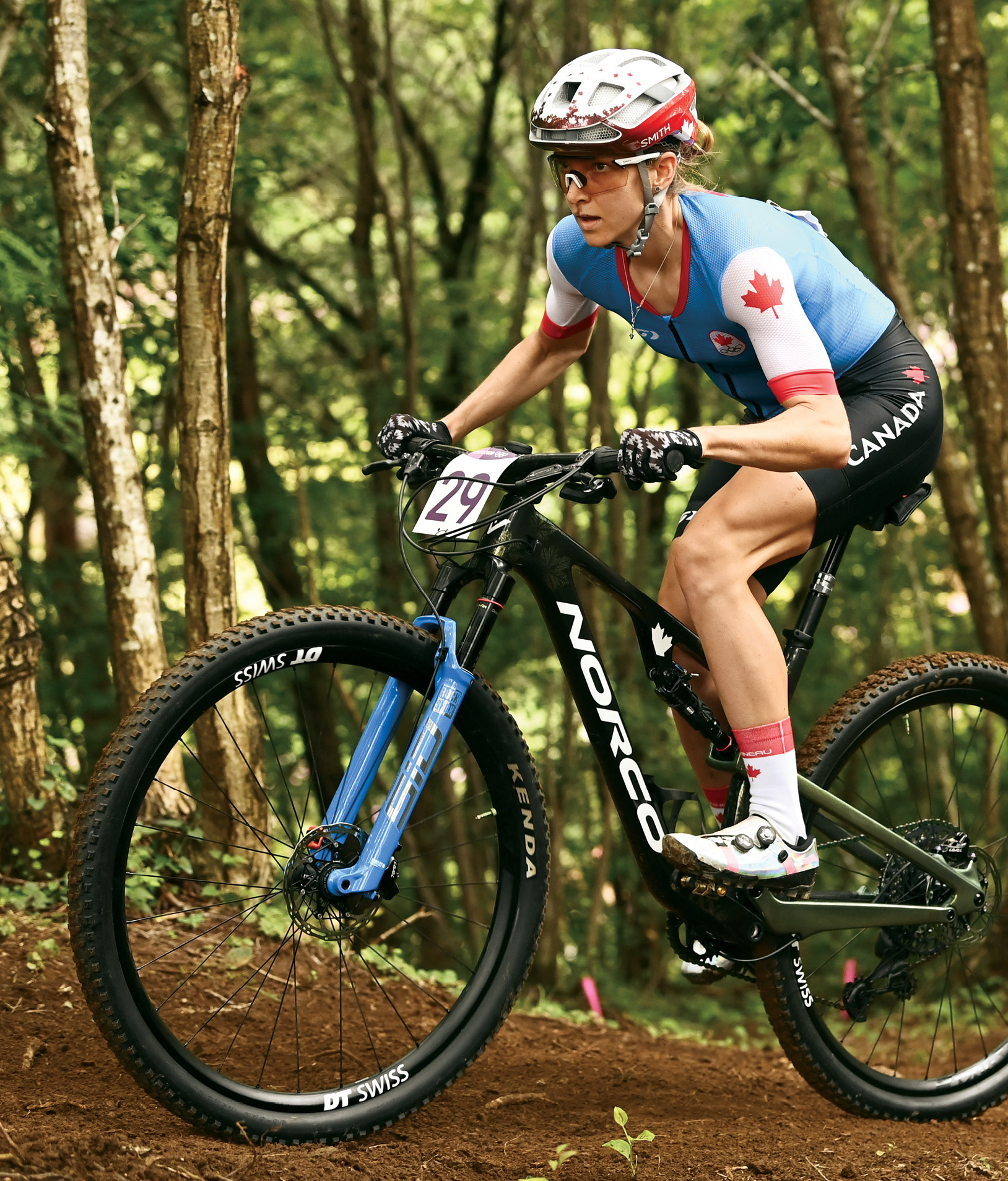 Haley Smith in Tokyo
Haley Smith in Tokyo
photo: Simon Wilkinson
What many people may not realize is that many athletes face arbitration panels when their qualifications are challenged. “There were attempts to discredit my results and my potential, so I really struggled with that,” Smith says. “In some ways, I understand why athletes contest qualifications. It’s your lifelong dream, and you want to fight for it. The Games undoubtedly bring out the best in people. But simultaneously, they can bring out the absolute ugliest.”
Mountain biker Jenn Jackson admits her feelings toward Olympic selection have evolved after having seen friends struggle with arbitration over the years. “Of course, it would be incredible to compete,” she says. “But I’m not as enamored with the Olympics being the one and only thing because I’ve been exposed to the selection drama over and over again. My overarching goal is just to be the best Canadian mountain biker.”
Obviously, athletes struggled more than ever in 2021 to feel as though they were living the dream. They had had August 2020 circled on their calendars for years and might have been poised perfectly for a great race in Tokyo, so moving the event to the summer of 2021 because of the pandemic was difficult. For Disera, it was devastating. “In early 2020, I called my coach, actually worried that I had too much fitness,” he says. “I was so ready, and suddenly, the world shut down and we couldn’t race, but we also didn’t know if the Games were actually going to be postponed. So I was trying to hold on to fitness in hopes that they would happen—which turned out to be a mistake. I just couldn’t relax.”
“The first part of being an Olympian is deciding whether you’re enjoying the pursuit of your sport enough to devote a large chunk of your young adult life to it. If the answer is yes, then you have to be reconciled to the fact that you might not go to the Olympics, but you’re going to spend the next decade fighting for it. So, do you love it enough? And are you going to survive not making it?” —Haley Smith
And then, the Games actually happened. “I remember finishing in Tokyo in 2021,” Disera says. “I had two feelings. First, I was just exhausted. I signed up for all of this mental effort and all of this work through 2020, and had to stretch it an extra year. My second thought was, I’m frickin’ mad. I don’t like my result. That wasn’t at all what I’m capable of. That’s not what I wanted to put out there.”
He’s still mad.
What it all comes down to is this: chasing the Olympic dream is worth it, getting it may not be.
“I try not to call it the Olympics,” Hoar says. “I call it the Olympic journey because that’s exactly what it is. It’s a journey that represents something that you accomplished. High-performance athletes are ordin-ary people doing exceptional things. Your journey is to do what you can to discover your full potential. If you’re using the Games to define that for yourself, it becomes much more psychologically difficult. We can’t define ourselves based on whether or not we attended a certain event. The journey has to be bigger. We just need to know that we risked, that we were courageous, that we went after a really ostentatious goal, that we dreamed big. And we did what we could with the resources we had.”
“I’ve jokingly said the past couple years that the Olympics are overrated, don’t go,” Smith says. “But that’s not true. The process of trying to get there is so worth it and so life-altering. The journey certainly is worth it. The Olympics aren’t the Games. To me, the Olympics are the lifestyle. What makes you an Olympian is the process of trying to get there. I would take that journey over and over again for the rest of my life if I could.”
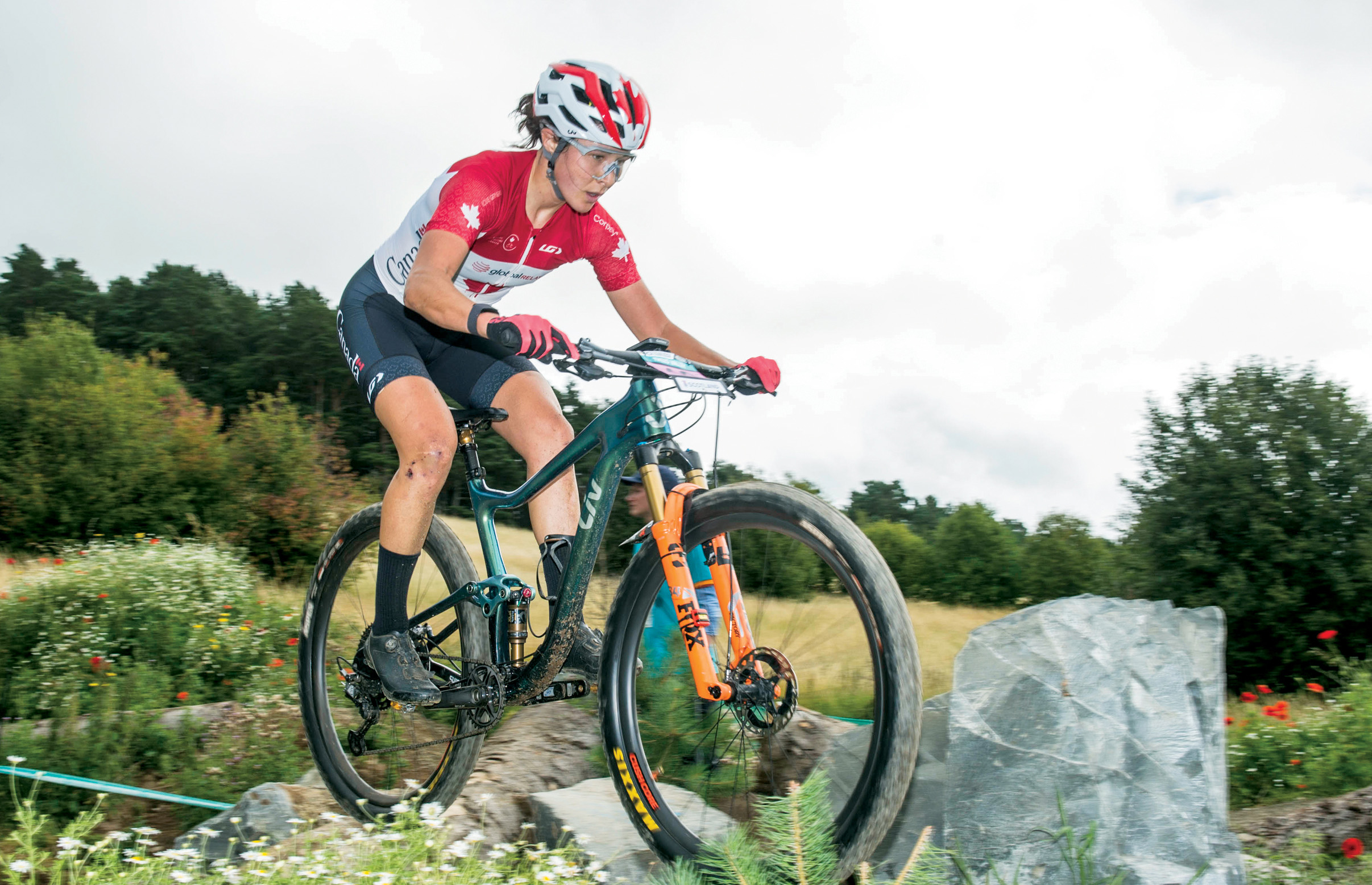 Jenn Jackson at the 2023 world championships
Jenn Jackson at the 2023 world championships
photo: Rob Jones
Two Canadian Jacksons preview the Olympic road and MTB courses
There’s something so perfect about chatting with 2023 Paris-Roubaix winner Alison Jackson and national cross country champion Jenn Jackson about the road and mountain bike courses we’ll be seeing in Paris. The Jacksons are forces to contend with. Both stand a good chance of being on the start line in France this summer. So, what can we expect?
A road course for Classics riders
Men’s course: 273 km with 2,800 m elevation gain
Women’s course: 158 km with 1,700 m elevation gain
Dates: Aug. 3 and 4
Time trial stats: 32.4-km flat course with several technical corners
Date: July 27
“It’s going to be a fun course. It’s dynamic. It’s technical. There are a lot of moments where something can happen,” Alison Jackson says. With more punchy climbs than sustained hauls up huge mountain passes, the racing action should be exciting to watch, even if it could easily take five or six hours to complete. With a cobbled climb at Montmartre featured three times in both the men’s and women’s races, riders will need technical proficiency in order to make a move—and to make it stick.
Canadians should be stoked about this news, since that’s what Alison Jackson does best. Consider her incredible effort at the 2023 Paris-Roubaix Femmes, where she led a tiny group all the way into the velodrome before out sprinting everyone and finishing off with a victory dance. The 9.5 km of flat heading back toward the Eiffel Tower and the finish should provide plenty of time to wind up a final sprint.
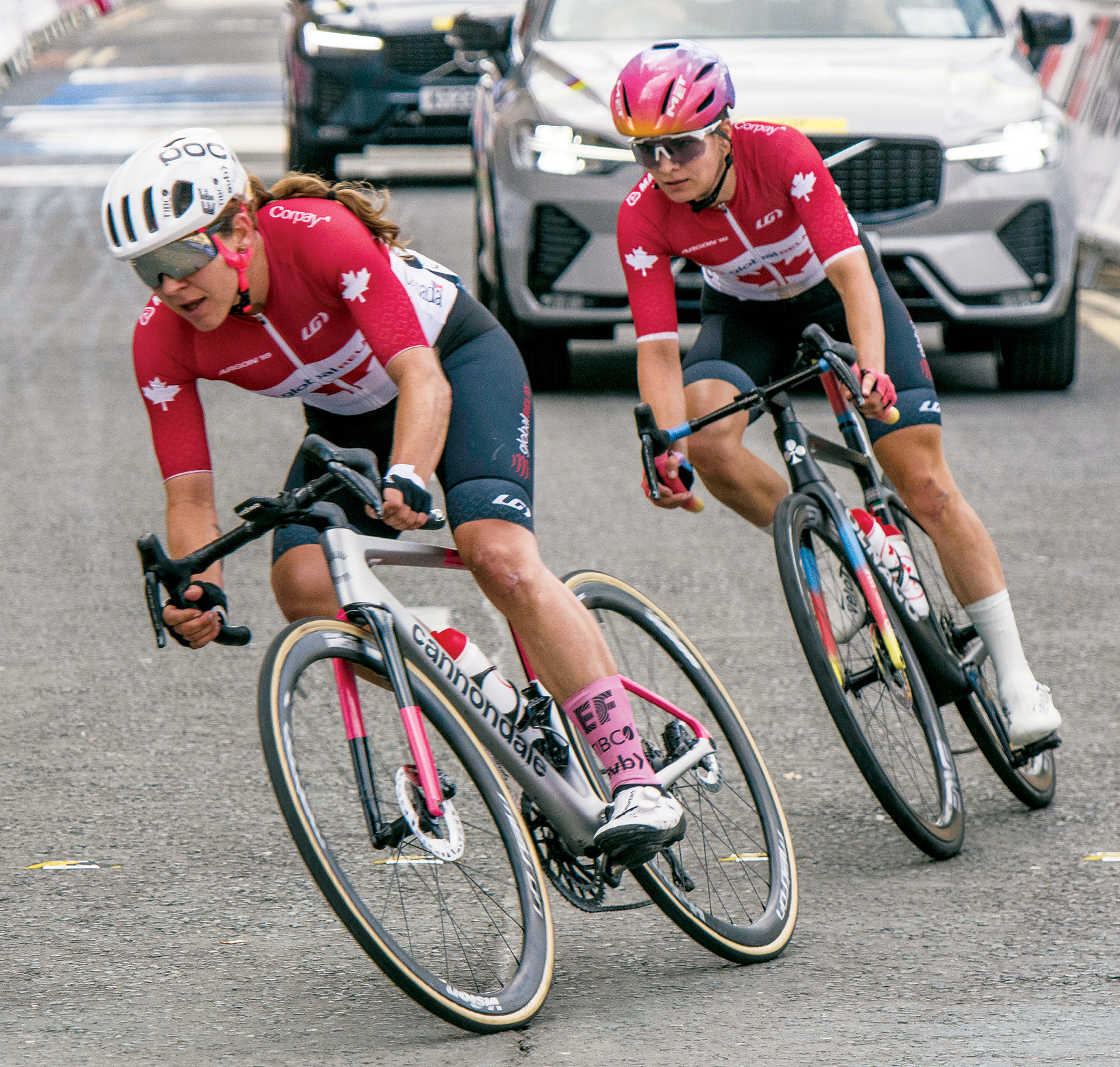 Alison Jackson and Olivia Baril, road worlds, 2023
Alison Jackson and Olivia Baril, road worlds, 2023
photo: Rob Jones
“This course really favours the bold rider. We’ve seen that work in past Olympics. I think that’s the attitude that I want to go in with: be willing to risk losing in order to win. I want to be in the action and give Canadians someone to really root for,” Jackson says.
In the men’s and women’s races, expect things to look a lot different than they normally do in the Grand Tours or Classics. “The team dynamic is so unique at the Olympic Games, because you’re not racing with your team. You only have five nations that have a team of four,” Jackson explains. “Then five nations have teams of three, and then it’s teams of two and one. So controlling the race is really hard for any nation. We go into the race with three women, which is really exciting for us. That’s a pretty good team.”
A mountain biker looks down on paris
Date: July 28-29
The Olympic mountain bike course is the highest point in the area, built into an artificial hill by an old quarry just 35 km southwest of Paris. From the summit, riders can catch a tiny glimpse of the Eiffel Tower.
“The course is very new school and man-made,” Jenn Jackson says. “It’s built into a hillside where they had to put a ton of crushed gravel down to handle any rain. It rained before the test event and the one section they had in the woods turned into a muddy, slippery mess. With the clay base, it was really difficult, so they added gravel to help the course hold up regardless of weather.
“It doesn’t feel like traditional mountain biking. It feels like these new events that we’re seeing at World Cups: courses with these built-up features and really abrupt rock sections that are not natural—but they’re built to seem natural—with lots of meandering longer sections in between. The course has a lot more steep pitches with the rocks, and a lot of undulating rolls and rises that let riders use their momentum. It doesn’t feel like authentic mountain biking, to be honest. But as a race course, it’s super fun.”
To watch riders struggle, keep an eye on the uphill rock garden where many flatted in the test event, thanks to the high speed at which they entered it. There may be a drop coming to the course (watch out, Mathieu van der Poel!), but during the test event, it hadn’t yet been constructed. There could still be a few more changes by race day. Another interesting component for racing? The A and B lines tend to be com-parable time-wise, says Jackson, so there may be more passing and interesting action as riders choose their lines.
Selection stress
It’s worth a quick footnote that neither Jackson is guaranteed an Olympic spot just yet. As Alison Jackson, who was a late addition to the 2020 squad, says, “Being in the sport for as long as I have, you always have to hold everything with an open hand, because anything can happen. You may have a key race, and then you might get injured or sick, so you have to be able to adapt to that. But at the same time, you do need to have that big goal in mind and make the daily choices that will lead up to achieving it. For me, I’m just focusing on all that is going to take me there in the best possible shape. If something derails the opportunity, I’m still doing all the right things. I’m still living like a champion.”
But let’s be honest: Alison Jackson is looking forward to more than just the road race. She’s also excited to mingle with fellow Olympians and watch some other events—in particular, the breakdancing, which is making its Olympic debut in Paris. Expect many, many TikToks.
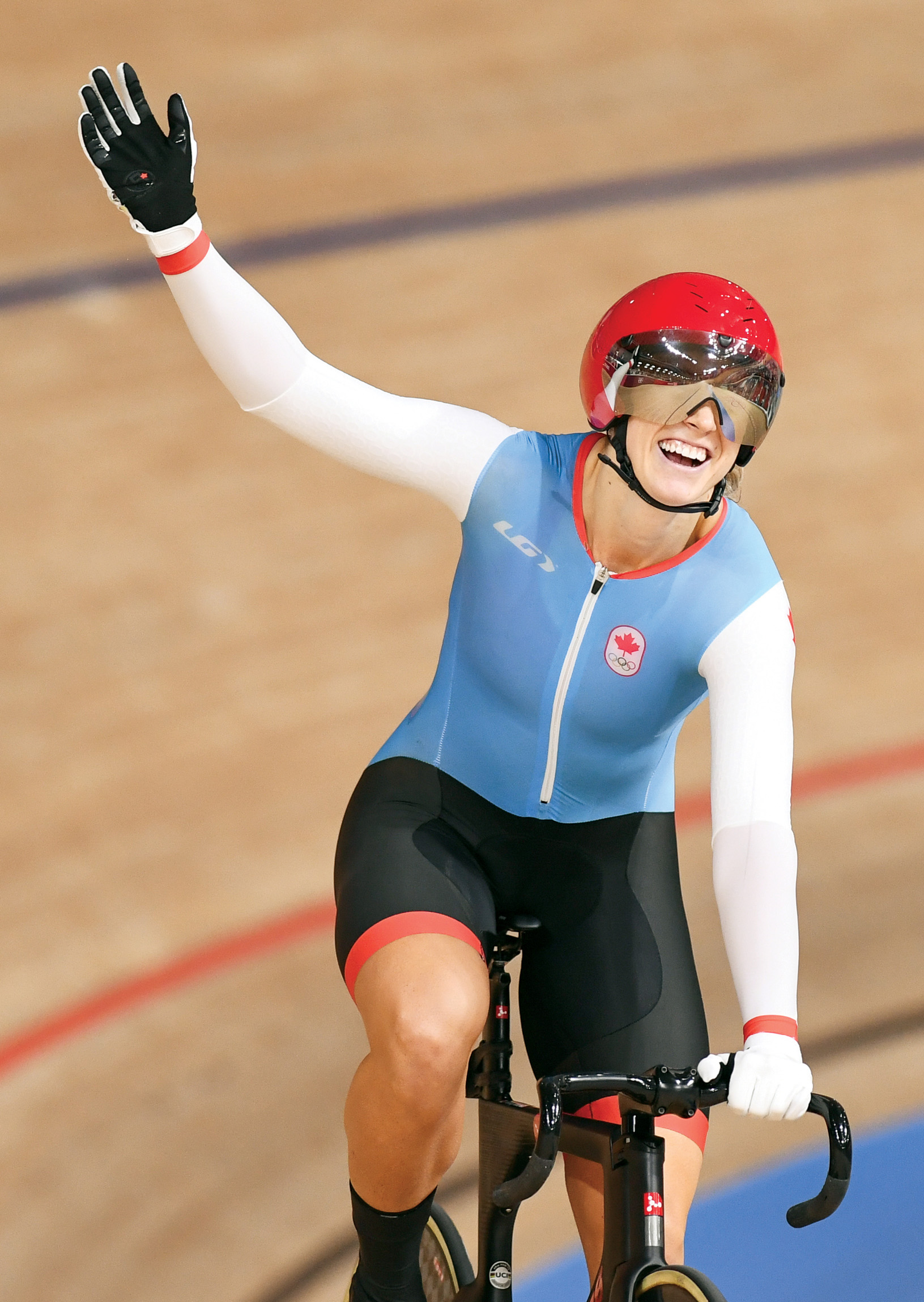 Kelsey Mitchell takes gold in the sprint in Tokyo
Kelsey Mitchell takes gold in the sprint in Tokyo
photo: Simon Wilkinson
Medal contenders in the velodrome
To find out what going for gold really means, I spoke with two medal contenders on the track—Kelsey Mitchell and Dylan Bibic. What makes these two so interesting? As track cyclists, they’re both at the edge of the age spectrum. At 30, Mitchell is one of the oldest racers on the track. At 20, Bibic is one of the youngest. How does age affect their mindsets, their goal setting and how they look at the races?
Kelsey Mitchell: back for another gold
Kelsey Mitchell wasn’t planning on being a track cyclist, and certainly not a decorated Olympian and world-record holder. But what she did know was that after university, she wasn’t ready to give up on being an athlete.
So, at 23 years old, she participated in RBC’s Training Ground, an athlete funding and talent-identification program, where the former soccer player’s power numbers were off the charts. She was originally hoping to be scooped up by the bobsled team, but Cycling Canada took notice and steered her into the burgeoning track program at the then-new velodrome in Milton, Ont.
“I just literally had really good leg power,” she says. “That was it.”
People often refer to Mitchell as a latecomer to the sport. She recalls being surrounded by teenagers on the track. “These kids were just 10,000 times better than me on the bike,” she says. “And I thought, OK, I’ve missed a lot of steps. It’s time to catch up. I felt I was late, but I didn’t feel like I was old as an athlete.”
Learning to ride a track bike isn’t “just like riding a bike,” though. “I didn’t know how to clip in, or even these little nuances like where to unclip during a pedal stroke, since there are no brakes. I had never thought about that until I was riding around and didn’t know what to do!” she says with a laugh. “I overthought everything.” (Don’t get her started on when she was handed her first pair of padded cycling shorts.)
“I didn’t grow up around cycling, but what I did have was pure athleticism and raw power,” she says. “When I told my family that Cycling Canada was interested in me, they said, ‘But you don’t ride a bike.’ It took them a while to wrap their heads around it.”
The power translated into sprint prowess, and the technical, tactical side of the sport became a game for Mitchell. At the Tokyo Olympics, she powered through six rounds in the sprint to take the win. “Honestly, the whole thing was like a fairy tale,” she says. “I knew my legs were good. I was the most relaxed I’ve ever been at a competition. All I could think was, there’s nothing else I could have done to be more ready for this moment.”
Once she figured out how to clip in and out, it was true love on the track. At 30 years old, she’s looking toward Paris—but 2023 wasn’t an easy year. “It was just a hell of a year,” she says. “It kicked my ass. Everything that I had done in the past—just go, go, go, head down, work hard—was not working. I was working harder than I worked before the Olympics, and I was just getting slower and slower. I wasn’t able to recover, but I kept pushing. It became a vicious cycle.”
“I think I was a little ignorant to everything that goes on in high-level sport,” she says, looking back. “I grew a lot as a person and learned a lot about myself and how the world works. Now, just to get to go to the Olympics again is going to be a big win. I want to race to win, and I know I’m capable, but even just getting there, I’ll be there proud of myself.”
“When the Olympics happened and I won the gold medal, it was incredible,” she says. “But after, people were asking me, ‘Now what?’ And I’m like, ‘What do you mean, now what?’ I keep riding. That’s what. I really truly love what I get to do every day.”
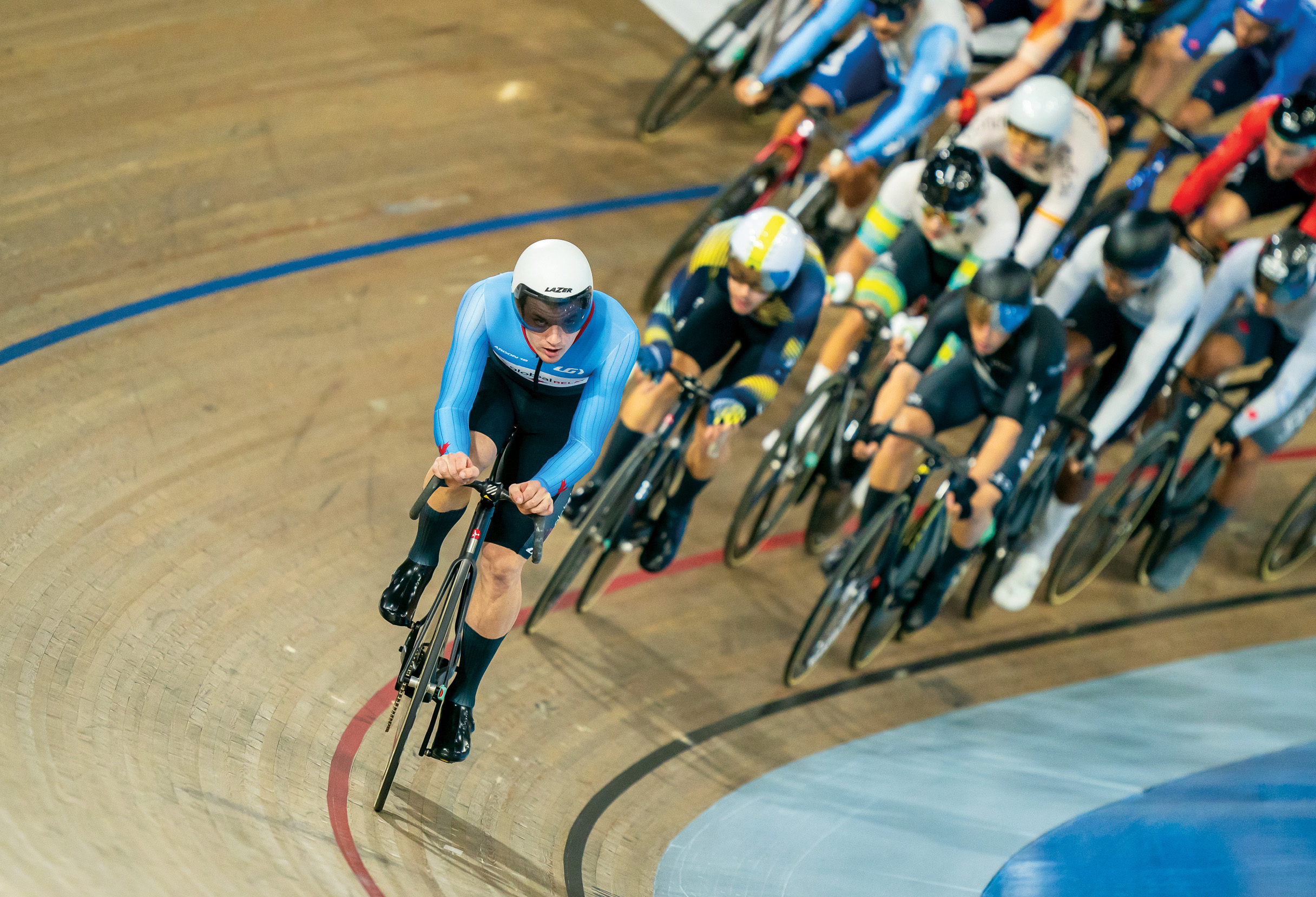 Dylan Bibic
Dylan Bibic
photo: Dave Holland
Dylan Bibic: omnium-focused
At 20 years old, Dylan Bibic has already had a full career on the track, including a world championship title. He’ll be honest: he really, really likes to win. That’s what got him hooked as a preteen, and what keeps him laser-focused on a gold medal in the omnium at Paris this summer.
“I like to win, and I’m pretty good at winning on the track,” he says when asked about why he loves racing at the velodrome. Can’t argue that. (He does still get nervous on the start line, lest you assume he’s cool as a cucumber. “I’m very nervous. I’m always nervous. I never really get less nervous,” he says, nervously.)
Winning a world championship title in the scratch race in 2022—in Paris at the same velodrome he’ll be racing on at the Olympics—was a moment for Bibic. “That was probably the best feeling I’ve ever had,” he recalls. “It took me a long time to believe it was real. I didn’t believe it right away. It felt too wild. But then, when they hand you the rainbow jersey, it becomes real.”
His closest competitors in that race were older than 30. “In most of my races, I’m the youngest,” he says. “I really looked up to a lot of those older racers when I was younger, and I still do. But now, it’s more like a mutual respect.”
Still, Bibic does ultimately dream of shifting to the road at some point in his career. A glance at his Strava—packed with rides longer than 150 km this winter—is a blend of omnium preparation and a dedication to the dream of the road. Training for the omnium requires a lot of hours, a lot of tactical practice, and a lot of mental and physical strength. There are four races within three hours: a scratch, tempo, elimination and points race. All require different tactics and talents—for the points race, you need a high threshold. To make it through all four, endurance is required. And of course, you’re going to need a crazy-powerful sprint.
“It’s a physically demanding sport,” Bibic says. “A lot of people assume that it’s not overly tactical or mental, but once you get into it, you realize it’s almost half tactics. A lot of the time, riders either have it or they don’t. You can tell right away. I can look at a race and see that there are only a small handful of racers who actually know how to counter moves properly and make the right decisions. At worlds or the Olympics, though, almost everyone is making the right moves at the right time, so you need to be flawless.”
“It takes a lot of the luck out of the equation since it’s four races,” Bibic adds. “It’s all about consistency. Personally, I like winning and knowing that I didn’t just get lucky. It was all me.”
“I believe that I can win a medal in the omnium,” he adds. “I’m fully confident that I have the physical capacity to get there. But I just need to get the work done.”
